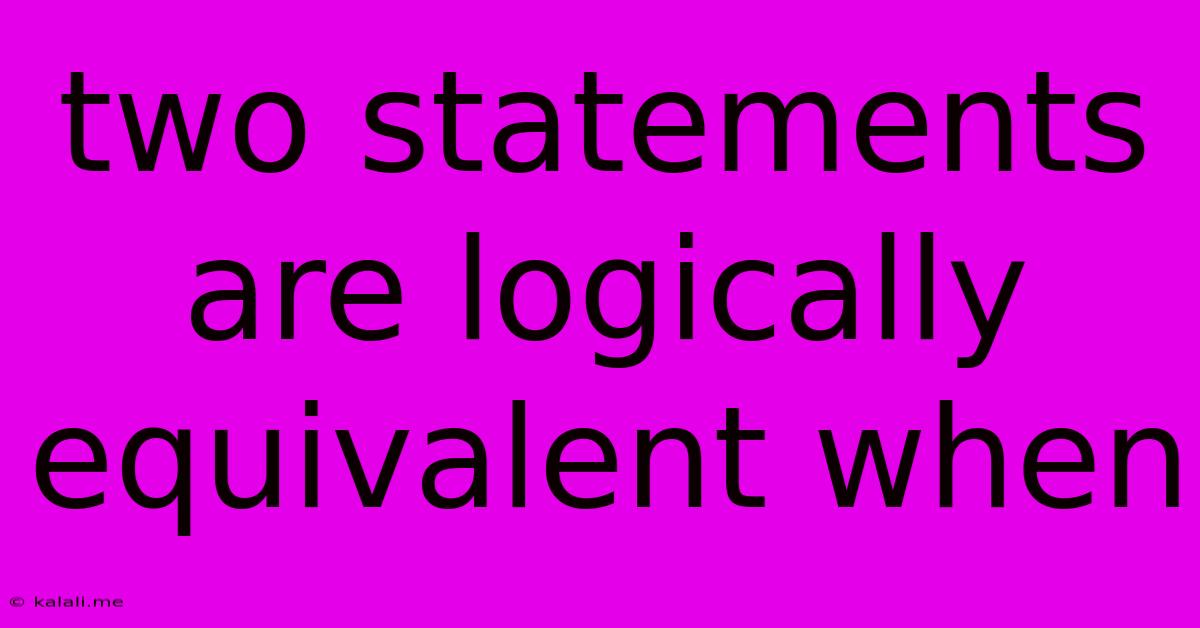Two Statements Are Logically Equivalent When
Kalali
May 29, 2025 · 3 min read

Table of Contents
Two Statements are Logically Equivalent When... A Deep Dive into Logical Equivalence
Understanding logical equivalence is fundamental to logic, mathematics, and even computer science. This article explores the meaning of logical equivalence, providing clear explanations, examples, and practical applications. We'll delve into how to determine if two statements are logically equivalent and why this concept is so crucial.
What does it mean for two statements to be logically equivalent? Two statements are logically equivalent if they have the same truth value under all possible circumstances. In simpler terms, they always produce the same outcome—true or false—regardless of the truth values of their individual components. This is often represented symbolically as P ≡ Q, where P and Q are the statements in question.
Identifying Logically Equivalent Statements
Several methods can help you determine if two statements are logically equivalent:
1. Truth Tables: This is a systematic approach. A truth table lists all possible combinations of truth values for the individual components of the statements and then evaluates the overall truth value of each statement for each combination. If the truth values for both statements match in every row, they are logically equivalent.
Let's illustrate with an example. Consider the statements:
- P: It is raining.
- Q: It is not not raining.
The truth table would look like this:
| P (It is raining) | ¬P (It is not raining) | ¬(¬P) (It is not not raining) |
|---|---|---|
| True | False | True |
| False | True | False |
As you can see, P and ¬(¬P) have the same truth value in every row. Therefore, they are logically equivalent.
2. Logical Equivalences Laws: Several established laws govern logical equivalence. These laws provide shortcuts for identifying equivalent statements without constructing truth tables. Some key laws include:
- Commutative Laws: P ∧ Q ≡ Q ∧ P and P ∨ Q ≡ Q ∨ P (Order doesn't matter for AND and OR)
- Associative Laws: (P ∧ Q) ∧ R ≡ P ∧ (Q ∧ R) and (P ∨ Q) ∨ R ≡ P ∨ (Q ∨ R) (Grouping doesn't matter for AND and OR)
- Distributive Laws: P ∧ (Q ∨ R) ≡ (P ∧ Q) ∨ (P ∧ R) and P ∨ (Q ∧ R) ≡ (P ∨ Q) ∧ (P ∨ R) (Distribution of AND over OR and vice versa)
- De Morgan's Laws: ¬(P ∧ Q) ≡ ¬P ∨ ¬Q and ¬(P ∨ Q) ≡ ¬P ∧ ¬Q (Negation of conjunction and disjunction)
- Law of Double Negation: ¬¬P ≡ P (Negating a negation returns the original statement)
- Identity Laws: P ∧ True ≡ P and P ∨ False ≡ P
- Domination Laws: P ∨ True ≡ True and P ∧ False ≡ False
By applying these laws, you can manipulate statements algebraically to demonstrate equivalence.
3. Logical Inference: Sometimes, you can use logical reasoning to show equivalence. This involves deducing the truth of one statement from the other, and vice versa, under all conditions.
Why is Logical Equivalence Important?
Understanding logical equivalence is crucial for several reasons:
- Simplifying Complex Statements: It allows you to replace complex statements with simpler, equivalent ones, making arguments and proofs easier to understand and manage.
- Formal Logic and Proof Systems: Logical equivalence is a cornerstone of formal logic systems and is essential for constructing valid proofs.
- Computer Science and Programming: Logical equivalence is used extensively in computer science for program verification, circuit design, and database optimization. Ensuring logical equivalence between different program segments is critical for preventing bugs.
- Clear Communication: Using logically equivalent statements can clarify complex ideas and improve communication.
In conclusion, recognizing logical equivalence is a powerful tool for simplifying complex ideas, constructing sound arguments, and ensuring accuracy in various fields. Mastering this concept will enhance your logical reasoning skills and broaden your understanding of fundamental mathematical principles.
Latest Posts
Latest Posts
-
Can You Replace Just The Tank On A Toilet
May 31, 2025
-
Where Is The Mic On The 3ds
May 31, 2025
-
Doctors First Name Or Doctors First Name
May 31, 2025
-
Effect Of Leading Edge Slat On Lift Curve Slope
May 31, 2025
-
What Did Jesus Say About The Old Testament Law
May 31, 2025
Related Post
Thank you for visiting our website which covers about Two Statements Are Logically Equivalent When . We hope the information provided has been useful to you. Feel free to contact us if you have any questions or need further assistance. See you next time and don't miss to bookmark.